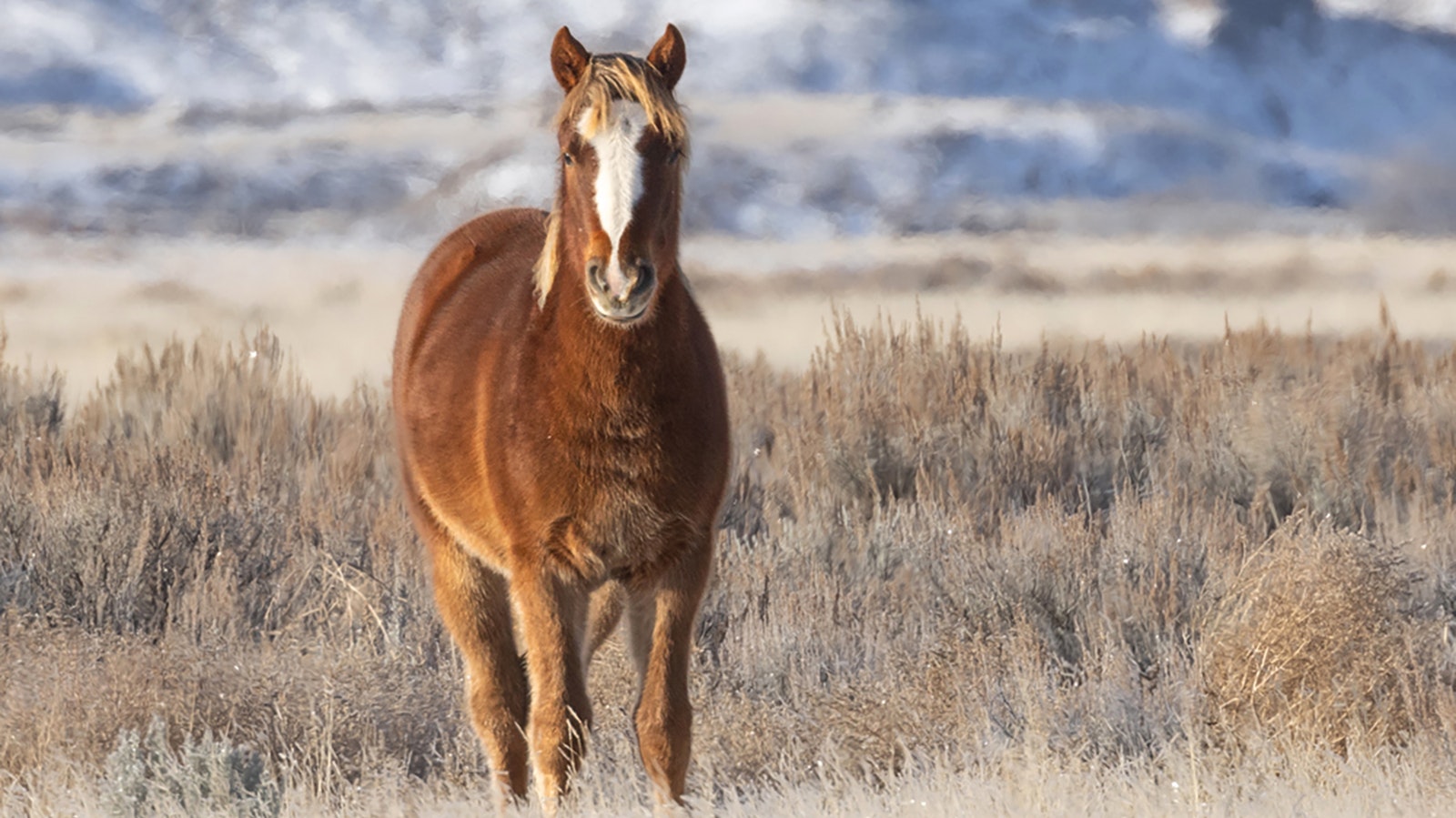As the Bureau of Land Management works to trim the McCullough Peaks mustang herd by about 35 horses, wild horse advocates claim the agency’s methods are cruel and led to the death of a young mare.
The McCollough Peaks Herd Management Area encompasses 109,814 acres east of Cody. There’s enough room and forage there to support a maximum of 140 mustangs. That’s why the BLM has been trapping horses and putting them in holding corrals there since November, trying to remove about 35 horses, Sarah Beckwith told Cowboy State Daily on Monday. She’s the public affairs officer for the BLM’s Wind River/Bighorn Basin District.
A Mare Called ‘Kat Ballou’
A year-old sorrel mare died in a temporary holding pen in the McCollough Peaks area late last week, and its carcass was taken to a veterinarian in Cody for a necropsy.
“The veterinarian determined that the horse died of head trauma, likely from running into a post in the corral,” Beckwith said.
The BLM frequently names mustangs, which sometimes gain social media fan bases. The mare that died was known as “Kat Ballou,” a play off “Cat Ballou,” the title of a 1965 Western comedy set in Wyoming starring Jane Fonda and Lee Marvin.
Kat Ballou and many other horses from McCullough Peaks have social media followers all over the world, wild horse advocate Sandy Sisti of Wapiti told Cowboy State Daily.
“I hear from people from the Netherlands, from Australia, who have never seen the horses, but they know everything about them because of the social media,” said Sisti, who runs Wild At Heart Images wildlife photography.
She added that Kat Ballou’s death hit her and her husband hard, because they witnessed the horse’s birth on Dec. 26, 2022.
Baited Corrals
The BLM is using baited corral traps to round up the McCullough Peaks horses.
“BLM staff can monitor the open trap remotely at all times,” Beckwith said. “When horses are detected in the open trap, BLM staff go to the trap and determine if any of those horses are horses that are selected for removal. If so, staff will close the gate manually onsite. Until staff closes the gate, the horses are free to move in and out of the trap.”
Because younger horses are easier to adopt out, the BLM is focusing on horses that are 5 years old or younger, she said. Those selected for removal are taken to the Rock Springs Wild Horse Holding Facility, and adoptions will be available online.
The corrals are cruel, because the mustangs “don’t know anything about corrals,” Sisti said, adding she thinks Kat Ballou may have gone into a panic in the holding corral and fatally hurt herself.
She added that some of the horses the BLM might remove are too young and still too attached to their mothers.
However, there has no indication of trouble before Kat Ballou died, Beckwith said.
“The four horses that were removed on Jan. 22 were calm throughout the process, from loading on and off the trailer, to adapting to the temporary holding corral,” she said. “When BLM staff checked in on the horses again that evening, they were calmly eating hay and drinking water. There were no issues.
“BLM staff have strictly adhered to the Comprehensive Animal Welfare Program throughout the gather. The Comprehensive Animal Welfare Program outlines required best practices and humane handling standards that prioritize the health and well-being of the wild animals.”

Is The Trimming Necessary?
There’s concern over whether it’s even necessary to remove mustangs from McCullough Peaks, wild horse advocate Angelique Rea of Thermopolis told Cowboy State Daily.
Fertility control, by shooting mares with darts containing birth control medication, has been implemented there for years, said Rae, owner of Wyld Rose Images wildlife photography.
She questions whether the BLM is following its own rules in managing the herd.
“The BLM Cody office has consistently ignored and failed to follow written BLM policy in this removal, it has failed to provide range measurement data showing that the horses caused degradation of the range, removal of wild horses due only to being over the Appropriate Management Level is not reason enough,” she said. “They are supposed to also show that the horses are causing damage.”
Older Herd
The McCullough Peaks herd is also aging out, Sisti said.
The birth control has spared mares the rigors of pregnancy and delivering foals, so they’re living longer, she said.
“A lot of mares are living to 25, 26, 27 years old,” and stallions are living into their late teens, Sisti said, adding that roughly 40% of the McCullough Peaks mustang herd is over age 15, and about 25 of the horses are past 20.
So, nature is already trimming the herd, she said, noting that cold snaps in October and January killed at least three older horses.
Roundup Still Needed, BLM Says
Even so, birth control and natural death aren’t enough to keep the McCollough Peaks herd at a number that is best for the range, and the overall health of the horses, Beckwith said.
“The purpose of this gather is to return the population to its high AML (appropriate management level), 140 horses, while maintaining genetic diversity; selectively remove a portion of horses for placement into the adoption program; and capture, treat and release horses for application of fertility treatment,” she said. “The gather will allow older horses to remain in the McCullough Peaks herd.”
And despite the mare’s death, wild horse gatherings are remarkably safe, Beckwith added.
“The vast majority, 98-99%, of animals are gathered without severe incident or injury that causes death,” she said, which is much better than figures for gathering other species, such as elk, deer and caribou.

Mark Heinz can be reached at mark@cowboystatedaily.com.





